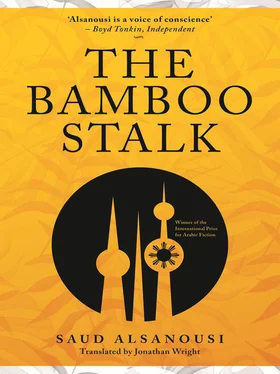A handsome young man, about my age or a little younger, dressed in a white thobe, walked past the children, kissed Hind and greeted Khawla in the outer courtyard, then walked inside. As soon as he walked through the wooden door, there were cries of ‘colololooosh’, a strange sound rather like the war cries of the American Indians — a shrill, high-pitched sound like a referee’s whistle. Khawla told me later that he was Nouriya’s eldest son and Grandmother’s first grandson. She always celebrated his visits by making this sound and in her prayers she asked God to give her a long life so that she could live to see him married.
The family members disappeared inside. I was still behind the curtain, with Inang Choleng in my hands. Thank God her shell was too hard to break under the pressure of my hands as I watched my family with a heavy heart from my exile in the annex. Just being with them would have been enough. Their voices sounded loud and close by despite the distance: their laughter, the words I didn’t understand, the ‘colololooosh’ rang in my ears.
The glass door opposite the door to my room opened. It was Nouriya in a strange outfit, maybe special for the occasion: a dress with wide sleeves, blood-red with shiny yellow decoration. ‘Isa! Isa!’ she started shouting.
I dropped Inang Choleng and didn’t notice she had hit the floor between my feet. Nouriya wrapped up her call with a ‘ Taal ’ and then went inside. I knew that word well. How could I forget it? She was inviting me into the sitting room to join in the party. Nouriya, who hated me, was calling me by name and inviting me in! I jumped for joy.
I don’t remember the aluminium door to my room, or the inner courtyard or even the glass door that led to the sitting room. I just remember standing inside the sitting room with the door behind me. They stopped chatting and a sudden hush fell on the room. I felt as if I had been struck deaf. All eyes were pinned on me. Grandmother took hold of the shawl thrown loosely over her shoulders and threw it on to her head. Hind and Khawla looked at each other in amazement. Awatif was aghast. Ahmad, her husband with the long beard, sprang to his feet and looked at me with sparks flying from his eyes. Faisal looked at his wife, Nouriya, as if seeking an explanation for what was happening. ‘ Salamuuu alekooom ,’ cried the parrot. Then through the front door Nouriya’s maid came in carrying a young boy. ‘Here’s Isa, madam,’ she told my aunt. Faisal stood up to take the boy.
Nouriya was flustered but handled the situation well. She passed me some silver bowls, then held out Faisal’s car key and asked me, as if I were a servant, to put the bowls in the car. I took the objects with trembling hands and before I left Ahmad suddenly shouted some words at me that I didn’t understand. He was waving his hands angrily and pointing at my aunts, but I couldn’t make out a word of what he was shouting. Khawla ran towards the stairs. Awatif looked horrified. Speaking in English that wasn’t very clear and that I understood only in part, she said something like, ‘You mustn’t come in like that when there are women present. Next time knock on the door and wait outside. That isn’t right. Do you understand?’
I nodded and said, ‘Very well, madam.’ I went out into the inner courtyard carrying Nouriya’s bowls. Babu, Lakshmi and Luzviminda were watching me in anguish from behind the kitchen window. I bowed my head and choked back my tears.
As I was putting the bowls in the trunk of Faisal’s car, Nouriya came up to me, her eyebrows raised and her face flushed. She glanced behind to the door of the main house. No one there. She grabbed my shirt and pulled on it. She clenched her teeth and said, ‘Listen. This time I saved you by pretending you’re a servant. Next time I’ll leave you to Awatif’s husband and he’ll slit your throat.’
I was so frightened my mouth was dry. I was trembling. The curtain on the upper-floor window overlooking the street moved. It was Khawla watching us from upstairs. Nouriya tightened her grip on my shirt and shook me. With great effort, I said, ‘But it was you who called me, Auntie.’
‘Shut up. I’m not your auntie,’ she said.
I got the message. I dropped the word ‘aunt’ before Nouriya’s name ever since that night on the pavement outside Grandmother’s house, or perhaps it fell into the boot of the car before I closed it on the bowls. Nouriya looked back again, checking that no one was there. ‘I was calling Isa my son, you idiot,’ she said. She let go of my shirt and gave her parting shot: ‘Don’t you ever speak unless you’re spoken to, you Filipino!’
The trick took in Ahmad and Faisal, although they were surprised that Grandmother had brought a male servant from the Philippines, since it was customary in Kuwait for people to have male servants from India or Bangladesh.
In my room, I hugged Inang Choleng. I wept like a child in front of the small bottle I had filled half-full with the soil I had brought from my father’s grave the day I visited the cemetery. I looked at the bottle as if asking the soil to bear witness to what was happening. I threw myself down on my bed and nodded off. I don’t remember how long I slept but I remember I was woken up by the sound of the dawn call to prayer. I had been close to death in a horrible dream. I was in Mindanao and my arms were tied behind my back and my face was to the ground. Nouriya and Awatif were holding down my shoulders, pinning me to the ground. Grandmother was sitting at a distance under the tropical trees with tears in her eyes but motionless. I was about to call out, to ask her for help, but someone pulled my head back by the hair. I looked straight into his eyes. It was Ahmad, Awatif’s husband, and he was holding a knife. ‘Grand. .’ I shouted, but Ahmad slit my throat before I could finish saying Grandmother’s name.
18
‘ Allahu akbar, Allahu akbar .’
Besides being the start of the call to prayer, that’s also the signal that it’s time to start fasting. I woke up terrified, repeating, ‘Grandmother, Grandmother.’ I was desperate for a drink of water. My throat was dry and I could feel my heart throbbing in my temples. I felt my throat with my fingers. No sign of blood. It was a nightmare, a sequel to the living nightmare that had taken place in the sitting room when I burst in without permission. I took a bottle of mineral water from the bedside table and gulped it down without stopping till I finished the bottle.
‘ Allahu akbar, Allahu akbar. ’
When she first translated the words of the call to prayer for me, Khawla said they meant that God is greater than everything else in existence and mightier than anything you can imagine. So if that’s how God is, I should give up complaining to Inang Choleng and telling her my sorrows . I picked the tortoise up from the bed and put it on the floor. I wanted to get closer to God, and as far as I knew, God resided in Awatif’s heart, and at that time Awatif was far away in her own house with her husband Ahmad. But could God be far away too? How can I open my heart to God? I asked myself. ‘ Allahu akbar, Allahu akbar.’ The phrase was repeated towards the end of the call to prayer.
I picked up my mobile phone and called Khawla. ‘I want to go to the mosque,’ I said. Khawla had just woken up to pray as well. ‘It’s only a few steps from the house. Go before the prayers start,’ she said.
‘Do I need one of those dresses that you and Grandmother and Hind wear when you pray?’ I asked.
She burst out in giggles. ‘Go as you are, man,’ she said. ‘But make sure you’ve done your ablutions.’
I didn’t know how to wash before praying. In fact I didn’t even know how to perform Muslim prayers. I stood by the wall of the house looking at the mosque. It was a small mosque in the courtyard in front of a large building that looked like a school. There were many cars parked in lines outside it. People pray in Ramadan more than at any other time. ‘I’ll wait till it’s less crowded,’ I said, and because I didn’t know how to wash for prayers, I had a complete shower. I wanted to do my ablutions properly, as Khawla had suggested. I came out of the bathroom with my body in a state of ritual purity. But what about my soul?
Читать дальше












